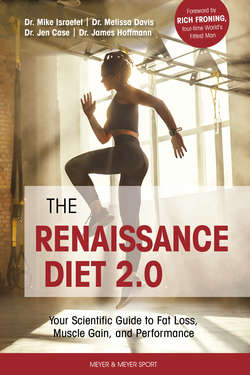Читать книгу The Renaissance Diet 2.0 - Mike Israetel, James Hoffmann - Страница 53
На сайте Литреса книга снята с продажи.
Carbohydrate in Performance and Body Composition Enhancement
ОглавлениеThe nervous system relies heavily on glucose; so much so that large rapid drops in blood glucose can cause failures in brain function and even death. The nervous system can use other fuel sources, like the ketones that are produced from fat and protein during times of low carbohydrate intake, but this is your body’s “emergency only” back-up.
Normal blood glucose levels sustain mental acuity, force production, and fatigue prevention. Brain cells are well fed and very responsive when glucose is readily available in the blood. This means that reaction times are quicker, decision-making is sharper, and motivation is higher.
When blood glucose is too low, nervous system operation can falter, leading to fewer motor units (parts of a muscle all connected to one nerve), contributing to a muscle contraction. This in turn leads to lower contractile force and less strength, speed, power, and endurance.
Falling blood glucose levels have been consistently shown to correlate with rising levels of fatigue. Tough competitions lead to mental and physical fatigue naturally, but low blood sugar hastens this fatigue. Maintaining blood glucose levels through carbohydrate consumption during sport training or competition can therefore delay the onset of fatigue.
Glucose is also the preferred fuel for high-intensity or voluminous physical exertion. Repetitive exertions of over 30% of the muscle’s maximum contraction force rely primarily on carbohydrates, particularly muscle glycogen. Nearly all sports require high levels of force exertion. While many sports are characterized in part by lower intensity exertions, it is often the magnitude of the high-intensity components that determines positive performance. This is particularly true for any style of weight training. There is an argument that singles (sets of 1 repetition) do not require much carbohydrate, and this is true at the acute level. Singles and doubles rely on stored ATP and creatine phosphate for energy. These contractions are still initiated by the nervous system, and thus dietary carbohydrate still benefits them even if high glycogen stores specifically do not. In addition, the recovery of ATP and creatine phosphate stores after each set relies on carbohydrate. In any case, repeated sets and any repetitions over 3 get a significant proportion of their energy needs via glycogen, so almost all weight-training styles, in addition to almost all sports, rely on carbohydrate for maximum performance.
Consuming carbohydrate is an extremely powerful means of preventing muscle loss. Carbs provide an energy source that prevents the breakdown of tissue for fuel. In addition, anabolism is achieved via both glycogen- and insulin-mediated pathways, both of which are directly affected by carb intake. Elevations in blood glucose resulting from carbohydrate consumption lead to the secretion of insulin, a highly anabolic hormone. Although insulin is anabolic to both muscle and fat tissue, for leaner individuals doing resistance training, the net effect of insulin is biased toward building muscle tissue more than fat tissue. Like many other hormones (be it testosterone, growth hormone, estrogen, etc.), insulin exerts most of its power when its concentration is chronically elevated. If insulin is high post workout for an hour but very low during the rest of the day, the total exposure of the muscles to insulin is relatively insignificant. If insulin is instead elevated for a large portion of each day, its anabolic and anti-catabolic signaling effects can add up to make substantial differences in muscularity over the long term (months).
While protein elevates insulin to some extent, fat does not elevate insulin much or at all. Carbohydrate consumption, on the other hand, has a predictable, consistent effect on blood insulin levels. If elevating insulin for muscle growth is the goal, then eating carbs is the easiest and most effective path.
Glycogen-mediated anabolism is perhaps even more important to muscle gain and retention. Eating carbs allows you to train harder, which grows more muscle and diverts more calories toward muscle repair and upkeep. When this is done on a hypocaloric diet, it has the potential to cancel the catabolism stimulated by insufficient calorie intake. Additionally, it has been repeatedly shown that training under low-glycogen conditions (resulting from low-carb eating) leads to more muscle loss than training under high-glycogen conditions. Multiple molecular pathways for these effects have also been elucidated, so both the effect and mechanism have been well studied. In other words, if you chronically under-eat carbs you will almost certainly gain less muscle on hypercaloric diets and lose more during hypocaloric phases.
